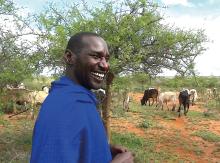Land Library
Bienvenue dans la bibliothèque du Land Portal. Explorez notre vaste collection de ressources en libre accès (plus de 74 000), comprenant des rapports, des articles scientifiques, des articles de recherche, des publications évaluées par des pairs, des documents juridiques, des vidéos et bien plus encore.
/ library resources
Showing items 1 through 9 of 316.This note provides guidance for businesses to identify and address legacy land issues in agricultural investments.
Evidence updates, produced by LEGEND’s Core Land Support Team, provide a series of short briefs, summarising emerging bodies of evidence from different sources on key themes related to land governance or particular country issues.
This Evidence update builds on and nuances the conclusions drawn in DFID’s Topic Guide on Women’s Empowerment in a Changing Agricultural and Rural Context (Murray, 2015).
Land and associated property is a major source of individuals’ identity and livelihood.
It is widely accepted among economists and policy-makers that secure and well-defined land property rights are integral to poverty alleviation and economic prosperity. But how do legal systems, land tenure and economic development really relate to one another?
Access to land is key to achieving food security, poverty alleviation, social equity and environmental protection. A brief insight in land governance-related principles and policies of the German development assistance.
Following the end of apartheid, South Africa’s government set itself ambitious goals with a planned land reform. However, there have since been barely any changes in the country’s agricultural structure, and the positive impacts that were hoped for on rural livelihoods have hardly materialised.
Indigenous Peoples and local communities hold a large share of the world’s land area under customary systems. However, there is a tremendous gap between what is held by communities in practice and what is formally recognised by governments.
The year 2016 marks 15 years since the new wave land reforms became operational in Tanzania. Despite its ambitious goals – encouraging land registration and titling, and empowering women and other vulnerable groups – the results are disillusioning.





